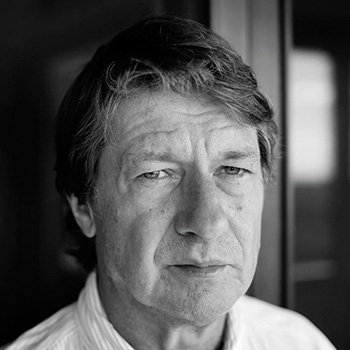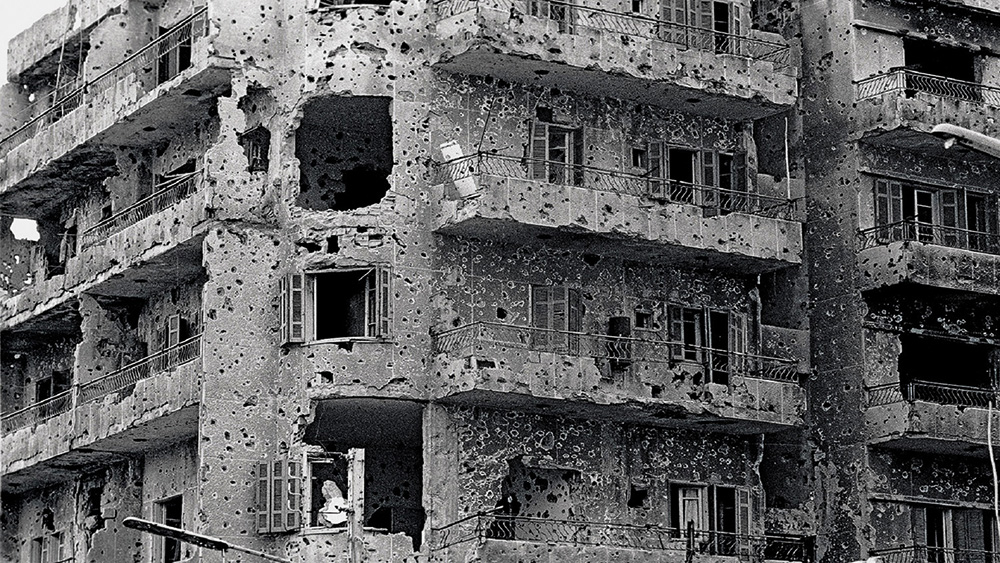When American writer PJ O’Rourke spent the autumn of 1984 in Lebanon as the country’s civil war began to heat up, the hotel receptionist in Beirut asked him whether he’d like a room “on the car bomb side, or the mortar bomb side”. TONY LENNOX reports
O’ROURKE’S comical but graphic account of the horror and confusion of a country in a catastrophic spiral of self-destruction never made it into the pages of Vanity Fair magazine; no-one needed a travelogue in a country with no tourists.

O’Rourke predicted that he would probably be the last western journalist to travel to Lebanon without being abducted. Not long afterwards, British journalist John McCarthy was kidnapped. He spent the next five years chained up in the Beirut cell with Irish teacher Brian Keenan and other hostages.
Keenan, in his account of that time, An Evil Cradling, recognised the parallels between the sectarian conflict he had known in Northern Ireland, and the one into which he was pitched.
Lebanon still teeters on the brink of disaster, but now the catalyst is the fighting in neighbouring Syria. Keenan, who now lives in Dublin, might see the similarities with Ireland.
During the 1970s and 80s, the Republic of Ireland’s economy went into a tailspin, partly due to the troubles in the north. It wasn’t until the Good Friday agreement, which brought a measure of stability, that the Republic began its journey to Celtic Tiger status.
Todd Sandler, professor of International Relations and Economics at University of Southern California, has studied the effects of civil war on neighbouring countries. His writings describe the destructive nature of the spill-over: instability, collateral damage, disruption to trade, diversion of foreign investment and influx of refugees. His work references these factors mostly in relation to wars in modern Africa.
An example is the land-locked African country of Chad: politically unstable, but made virtually ungovernable by wars and terrorism in neighbouring Libya, Sudan, and Nigeria.
The woes of Lebanon stem partly from the country’s fragile situation, following a civil war which lasted from 1975 to 1990. The disintegration of Lebanon, from the jewel of the eastern Mediterranean to hell-hole, shocked the globe. The capital, Beirut – once a sophisticated cosmopolitan city, famed for its French and Ottoman architecture, fabulous cuisine and the ease with which Christianity and Islam lived side by side – became a byword for ferocious sectarianism.

Tourism, at the time worth 10 percent of the country’s total economy, ceased. Visitors used to flock to Beirut, the Paris of the East, from all quarters. The ancient Phoenician cities of Tyre and Sidon were magnets for those in search of history. The Gulf nations have advised citizens not to travel to former holiday destinations in Lebanon because of security fears.
The war in Syria is entering its sixth year. It is estimated that the influx of up to 1.5 million Syrians (a quarter of the total population of Lebanon), has sent unemployment soaring. As many as 300,000 Lebanese workers have lost their jobs in the past five years. The blame, they say, lies with incomers prepared to work for lower wages. The refugees are imposing a great strain on infrastructure – welfare aid, medicine, jobs.
At the same time, veterans of the Middle East, like seasoned British journalist Robert Fisk, say Lebanese employers are exploiting the situation. Syrian refugee children, he says, are being used as virtual slave labour, picking fruit in farms in the Bekaa Valley for pennies.
The war has also disrupted overland imports into Lebanon, which had previously relied on corridors through Syria from Jordan and Iraq and beyond. The overland routes are not safe – and in some cases they no longer exist. The cost of importing and exporting by air freight is adding to costs, leading to the inflation of food prices in Lebanon.
Banking has traditionally been the mainstay of Lebanon’s services-oriented economy, but the government has had to pledge the bulk of its resources to reconstruction, which has led to a high level of public debt. Lebanon depends on foreign cash, but direct investment from overseas is being hampered by bureaucracy, corruption and high taxes.
Rafic Hariri, Lebanon’s prime minister from 1992 to 1998, is generally credited with rebuilding Beirut following the civil war. A moderate and pragmatist, he worked with Syrian overlords to reconstruct the Lebanese economy – but it was an open secret that he personally profited from his position. His own construction company bought chunks of the capital at a fraction of their value. His personal fortune had increased from $1billion to $16 billion by the time of his assassination in 2005.
A succession of wily politicians and officials has continued to follow Hariri’s example. Corruption in the system is widespread, and the current political paralysis is only encouraging corruption. The country has been without a president since May 2014 because of divisions between Christians, Sunni and Shi’ite Muslims. Government institutions no longer function.
The World Bank, in its latest Lebanese report, warns that the continuing stagnation in government, as much as the effects of the war on Lebanon’s doorstep, is a serious challenge.
Could Lebanon go bankrupt? It isn’t impossible. The burden of public debt, which has soared in the past five years, coupled with the country’s sluggish growth, is widening the fiscal deficit. GDP growth has virtually stalled. It is estimated that the cost to the Lebanese economy of the war in Syria has exceeded $7 billion – the equivalent of 15 percent of GDP.
Citizens of Beirut have taken to the streets in massive protests. The genesis of the demonstrations was the catastrophic collapse of the city’s waste disposal operations. Land-fill sites were full, so rubbish simply piled up on the streets.
The protests grew to incorporate a more general discontent with the government, widely perceived as corrupt and incompetent. An encouraging element of the dissent was its lack of sectarianism: the demonstrators came equally from Christian, Sunni and Shi’ite communities in Beirut. This could be seen as a sign that Lebanon may one day return to the balance that made the country the Switzerland of the East.
The main hope must be an end to the war in Syria, however unlikely that appears right now. The World Bank estimates that the rebuilding of Syria could be worth $200 billion to business and industry – and Lebanon, being Syria’s main route to the Mediterranean, would be well-placed to grab a hefty slice. Businesspeople and policy-makers are already said to be preparing the ground for Lebanon to become the hub of that restoration process.
But there is also a fear that sectarian divisions, reignited by the war in Syria, could lead to a new civil conflict in Lebanon. As P.J. O’Rourke observed in 1984: “In Lebanon you’d be crazy not to have a gun. Though, I assure you, all the crazy people have guns, too.”




























